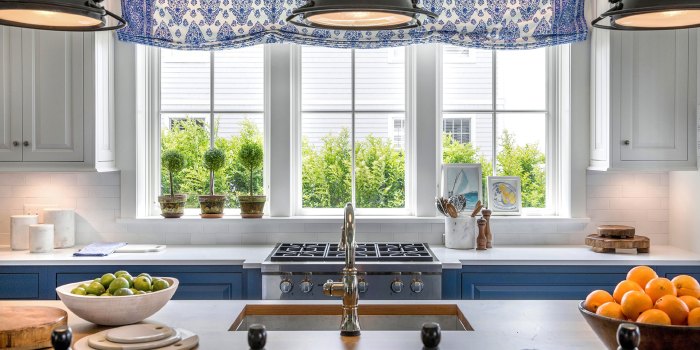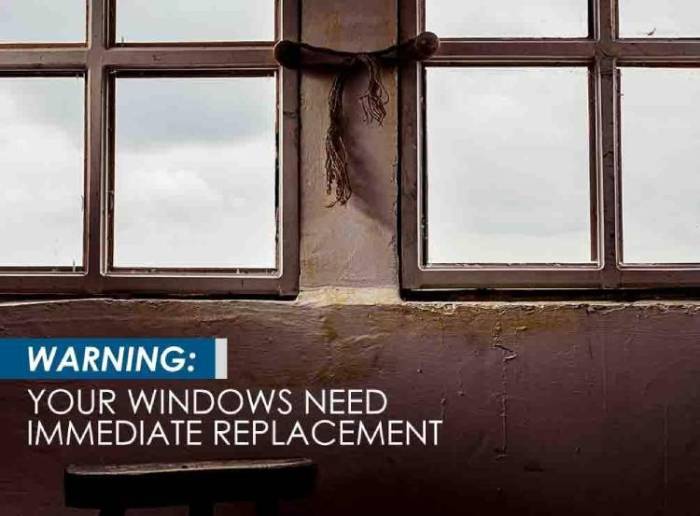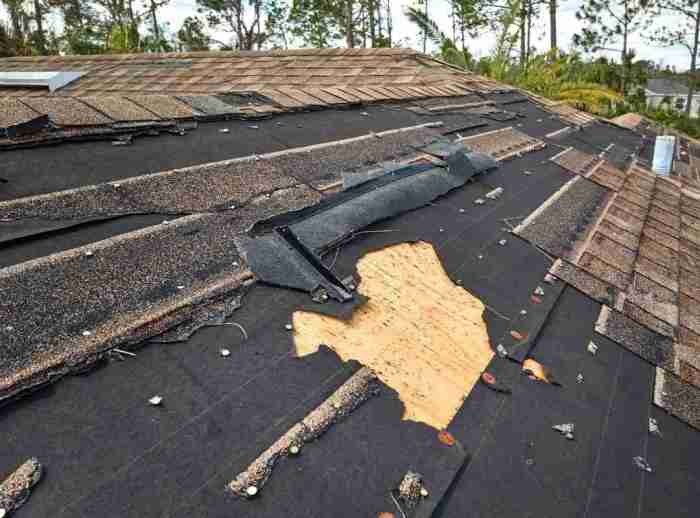Title: Top 7 Signs You Need New Windows – And How to Replace Them
Delving into Top 7 Signs You Need New Windows – And How to Replace Them, this introduction immerses readers in a unique and compelling narrative, with a casual formal language style that is both engaging and thought-provoking from the very first sentence.
Exploring the importance of new windows in a home, the signs indicating the need for replacement, window replacement options, costs involved, installation choices, energy efficiency benefits, and maintenance tips for longevity sets the stage for a comprehensive understanding of the topic.
Importance of New Windows
Having new windows in a home is crucial for various reasons, ranging from improving energy efficiency to enhancing overall comfort and aesthetics.
Improved Energy Efficiency
One of the key benefits of replacing old windows with new ones is the significant improvement in energy efficiency. Old windows are often drafty and can allow heat to escape during the winter and cool air to seep out during the summer.
This leads to higher energy bills as your HVAC system works harder to maintain a consistent temperature. New windows with advanced insulation properties can help reduce energy loss, resulting in lower utility costs and a more environmentally friendly home.
Enhanced Comfort and Aesthetics
Aside from energy efficiency, new windows can also enhance the overall comfort and aesthetics of your home. Modern windows come in a variety of styles, colors, and materials to complement your home's design and improve curb appeal. Additionally, new windows can provide better sound insulation, reducing noise from the outside and creating a more peaceful indoor environment.
Signs You Need New Windows
Old windows can cause a variety of issues that affect the comfort and safety of your home. Here are the top signs that indicate it's time for new windows:
Drafts
Drafts are a common sign that your windows are no longer effectively insulating your home. You may feel cold air coming in during the winter or hot air during the summer. This can lead to increased energy bills as your HVAC system works harder to maintain a comfortable temperature.
Condensation
Condensation between window panes or on the inside of windows is a sign of seal failure. This can not only obscure your view but also indicate that the windows are no longer energy efficient. Moisture buildup can lead to mold growth and impact indoor air quality.
Difficulty Opening/Closing
If you struggle to open or close your windows, it could be a sign of warped frames or hardware issues. This not only affects ventilation but also poses a safety risk in emergencies where quick window operation is crucial.
Window Replacement Options
When it comes to replacing your windows, there are several options to choose from based on your needs and preferences. Each type of window has its own set of features, pros, and cons, so it's important to consider them carefully before making a decision.
Double-Hung Windows
Double-hung windows are a classic choice that allows both the top and bottom sashes to move up and down. They provide excellent ventilation and are easy to clean. However, they may have a higher risk of air leakage compared to other window types.
Casement Windows
Casement windows are hinged on one side and open outward with a crank handle. They offer great ventilation and a tight seal when closed, making them energy-efficient. However, they may not be suitable for all architectural styles.
Sliding Windows
Sliding windows consist of two sashes that slide horizontally past each other. They are easy to operate and provide a contemporary look. However, they may have limited ventilation compared to other window types.
Bay Windows
Bay windows extend outward from the wall, creating a cozy nook inside the room. They add architectural interest and allow for more natural light to enter the space. However, they can be more expensive to install and may require additional maintenance.
Cost of Window Replacement
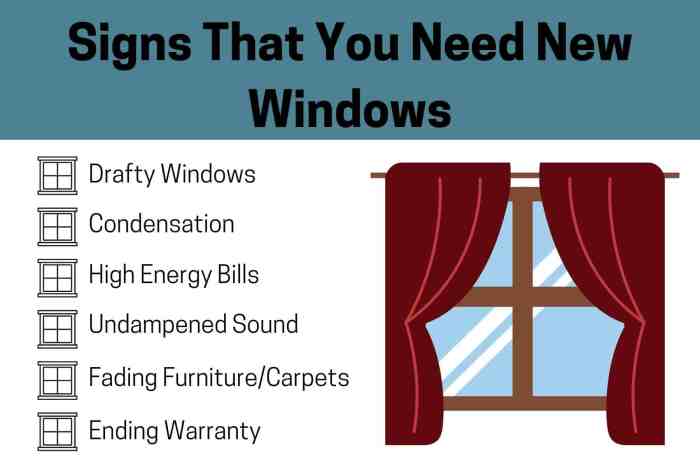
Replacing windows can be a significant investment, and understanding the typical costs associated with this home improvement project is crucial for budgeting and planning purposes.
Factors Influencing Cost
- Window Materials: The type of material you choose for your new windows, such as vinyl, wood, or fiberglass, will have a significant impact on the overall cost.
- Window Style: Different window styles, such as double-hung, casement, or picture windows, come at varying price points.
- Installation Requirements: Factors like the size of the windows, accessibility, and any necessary repairs or modifications to the window openings can affect the cost of installation.
- Energy Efficiency Features: Opting for energy-efficient windows with features like low-E coatings or double-pane glass may increase the initial cost but can lead to long-term savings on energy bills.
Tips for Budgeting and Planning
- Get Multiple Quotes: Obtain quotes from several reputable window replacement companies to compare prices and services.
- Consider Long-Term Savings: While upfront costs are important, also factor in potential energy savings and increased home value with new windows.
- Explore Financing Options: If the cost of window replacement is a concern, look into financing options or payment plans offered by window companies.
- Plan Ahead: Schedule your window replacement during off-peak seasons or times when contractors may offer discounts or promotions.
DIY vs. Professional Installation
When it comes to replacing windows, homeowners often face the decision of whether to tackle the project themselves or hire professionals. Both options have their advantages and disadvantages, so it's essential to consider the skills required, tools needed, and when it's best to seek professional help.
Advantages and Disadvantages of DIY Window Replacement
- Advantages:
- Cost-saving: DIY window replacement can be more budget-friendly as you won't have to pay for labor costs.
- Flexibility: You can work on your own schedule and pace without depending on a contractor.
- Sense of accomplishment: Completing a DIY project can be fulfilling and rewarding.
- Disadvantages:
- Lack of expertise: DIYers may not have the necessary skills or experience to ensure proper installation.
- Risk of mistakes: Incorrect installation can lead to air leaks, energy loss, and potential damage to the windows.
- Time-consuming: DIY projects can take longer to complete, especially if encountering unforeseen challenges.
Skills and Tools Required for DIY Window Installation
- Skills:
- Basic carpentry skills for measuring, cutting, and fitting the new windows.
- Understanding of window installation techniques and procedures.
- Patience and attention to detail to ensure a precise and secure installation.
- Tools:
- Tape measure, level, hammer, screwdriver, pry bar, caulking gun, and other basic hand tools.
- Safety equipment such as gloves, goggles, and a dust mask.
- Specific window installation tools like shims, foam insulation, and sealant.
When to Seek Professional Help for Window Replacement
- Complex installations: If your windows are large, unusually shaped, or require structural modifications, it's best to hire professionals.
- Time constraints: If you have limited time or availability to complete the project, professionals can ensure a quicker turnaround.
- Warranty concerns: Some window manufacturers require professional installation to maintain warranty coverage.
Energy Efficiency and Window Upgrades
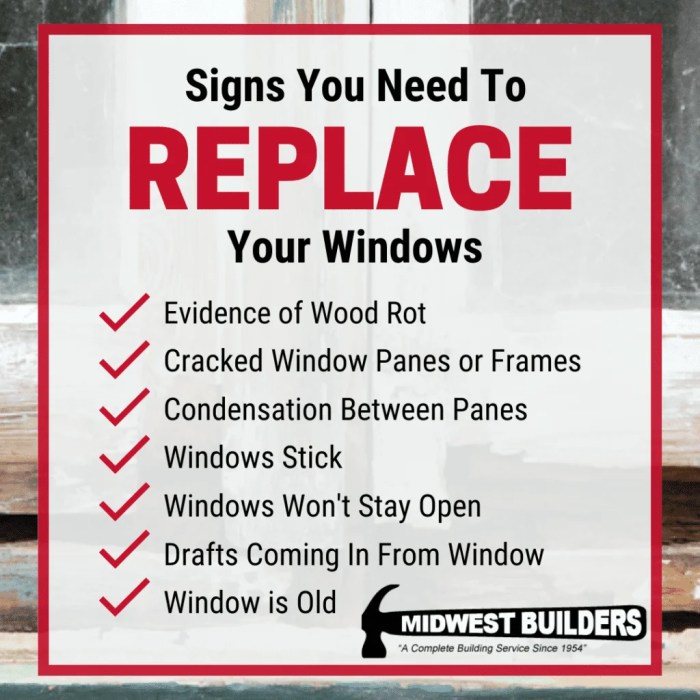
Upgrading to energy-efficient windows can have a significant impact on reducing utility bills for homeowners. These windows are designed to provide better insulation, keeping the indoor temperature stable and reducing the need for heating or cooling systems to work overtime.
Importance of Window Insulation
Window insulation plays a crucial role in maintaining energy efficiency within a home. By preventing air leaks and drafts, insulated windows help regulate indoor temperatures, leading to lower energy consumption and reduced utility costs.
Low-E Coatings and Energy Ratings
Low-E coatings on windows are designed to reflect heat back into the room during the winter and block out heat during the summer, improving overall energy efficiency. Energy ratings, such as the U-factor and Solar Heat Gain Coefficient (SHGC), provide valuable information on a window's performance in terms of insulation and heat gain/loss.
Choosing Energy-Efficient Windows
When selecting energy-efficient windows for a home, consider factors such as the frame material, glazing type, and overall design. Look for windows with high energy ratings and features like double or triple glazing, gas fills, and insulated frames to maximize energy savings.
Maintenance Tips for New Windows
Proper maintenance is crucial for ensuring the longevity and performance of your new windows. By following these guidelines, you can keep your windows in top condition for years to come.
Cleaning Techniques
- Regularly clean the glass panes with a mild detergent and water solution to remove dirt and grime.
- Avoid using abrasive cleaners or rough materials that could scratch the glass surface.
- Don't forget to clean the window frames and tracks to prevent buildup of debris.
Lubrication of Moving Parts
- Apply a silicone-based lubricant to the hinges, locks, and rollers of your windows to ensure smooth operation.
- Check for any signs of wear or damage on moving parts and replace them if necessary.
- Regular lubrication will prevent sticking and prolong the lifespan of your windows.
Regular Inspections
- Inspect your windows periodically for any cracks, leaks, or damage that may compromise their efficiency.
- Look out for signs of moisture between the glass panes, which could indicate a broken seal.
- Address any issues promptly to prevent further damage and maintain energy efficiency.
Concluding Remarks

In conclusion, understanding the signs that signal the need for new windows and how to replace them is crucial for maintaining a comfortable and energy-efficient home. By being aware of these factors, homeowners can make informed decisions that enhance their living spaces.
Essential Questionnaire
Question: What are the benefits of replacing old windows with new ones?
Answer: Replacing old windows with new ones can improve energy efficiency, enhance home comfort and safety, and add aesthetic appeal to the property.
Question: How do I recognize the signs that indicate the need for new windows?
Answer: Signs such as drafts, condensation, and difficulty opening/closing windows are indicators that it may be time for window replacement.
Question: What factors influence the cost of window replacement?
Answer: Window materials, installation requirements, and the type of window chosen can all influence the overall cost of window replacement.
Question: When should I seek professional help for window replacement instead of opting for DIY?
Answer: It is advisable to seek professional help for window replacement when dealing with complex installations, specialized windows, or lack of necessary tools and skills for a successful replacement.
Question: How can I maintain new windows for longevity?
Answer: Proper care and maintenance of new windows involve regular cleaning, lubrication of moving parts, and routine inspections to ensure they remain in optimal condition for a longer lifespan.
